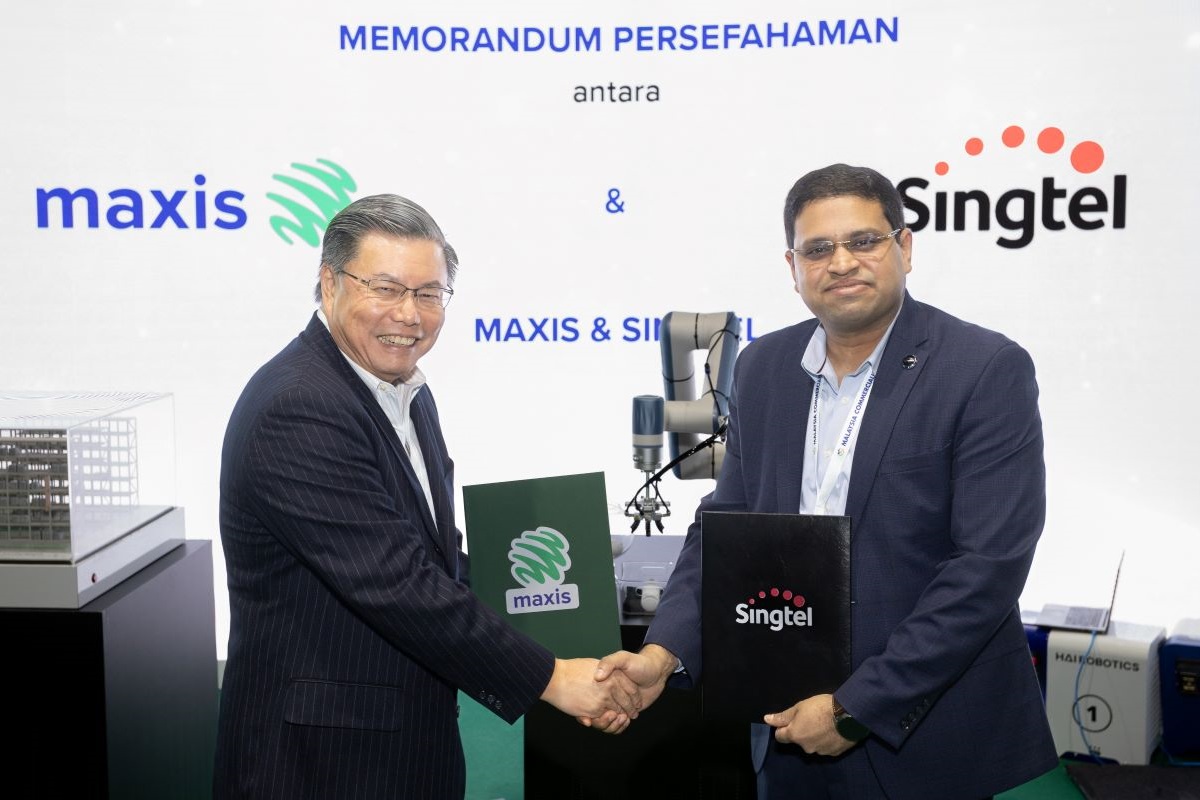News in Cloud Computing & Data Storage
Data Centre Operations: Optimising Infrastructure for Performance and Reliability
Edge Computing in Modern Data Centre Operations
Enterprise Network Infrastructure: Design, Performance & Security
News
News in Cloud Computing & Data Storage
Malaysia’s first 5G orchestration platform announced
Maxis has partnered with Singtel to introduce Malaysia's first all-in-one platform for 5G network, edge computing, cloud and services orchestration, built on Singtel’s Paragon for telco networks.
The platform will make 5G-Advanced (5G-A) and 5G technology, edge and multi-cloud computing more accessible to Malaysian businesses and accelerate digital transformation across various verticals such as manufacturing, logistics, healthcare and public services.
The partnership was formalised during the Malaysia Commercialisation Year (MCY) Summit 2024, an event organised by the Ministry of Science, Technology and Innovation (MOSTI) to drive the national commercialisation ecosystem. The Summit was officiated by Guest of Honour YAB Dato’ Seri Anwar Ibrahim, Prime Minister of Malaysia. The Memorandum of Understanding (MoU) exchange took place at the Maxis booth between Goh Seow Eng, CEO of Maxis, and Manoj Prasanna Kumar, Chief Technology Officer of Singtel Digital InfraCo.
Made available in Malaysia through Maxis’ enterprise arm, Maxis Business, the platform will enable ‘on-demand’ edge computing services, providing customers with access to low-latency computing, GPU as a Service (GPUaaS) and storage. With its multi-access edge computing (MEC) capabilities, data from end-users and devices can be processed at the edge. This, combined with Artificial Intelligence (AI), provides real-time processing and intelligent decision-making.
Paragon offers a powerful marketplace available to both Maxis customers and partners, making it easy for enterprises to create network slices on-demand and deploy mission-critical 5G applications on MEC – all with the click of a button.
Goh Seow Eng, CEO of Maxis, says, "Our collaboration addresses customer needs by providing a unified 5G platform that simplifies orchestration across network and cloud environments. The platform enables greater access, speed and flexibility for businesses to deploy and manage 5G and cloud computing solutions seamlessly.
"This will help them to focus on their core business, further strengthening their competitiveness globally. As the country’s leading integrated telco, we look forward to accelerating 5G-A and 5G adoption and the digitalisation of Malaysian businesses as the preferred digital business partner.”
Bill Chang, CEO of Singtel Digital InfraCo, adds, "We’ve seen a strong shift in demand from enterprises for 5G and edge computing capabilities to accelerate their digital transformation. Singtel has been leading the charge, forging various strategic partnerships with telcos globally with Paragon, being instrumental in this adoption.
"Paragon enables faster monetisation of 5G infrastructure by reducing complexities for telcos to deliver and scale 5G use cases. We are pleased to partner with Maxis to mutually expand and deepen the service opportunities of 5G and edge monetisation in Malaysia.”
The platform’s capabilities can benefit businesses through a wide range of enterprise applications across different verticals that require high-speed data processing, such as real-time analytics, mixed reality and autonomous systems. The platform will be locally hosted and deployed in Malaysia, to cater to the cybersecurity and data sovereignty requirements for Malaysian businesses.
Platforms built and powered by Paragon have now successfully been deployed in four ASEAN markets. With Maxis bringing the capability exclusively to Malaysia, multinational companies will be able to operate with ease, with a common experience and unified architecture across the region. The deployment is timely given Malaysia’s upcoming ASEAN chairmanship in 2025, where the nation will play a more active role leading the regional bloc’s economic and digital aspirations.
Maxis says that the partnership demonstrates its commitment to bringing innovation to the market and enabling Industry 4.0 transformation through real-world use cases. In addition to 5G and cloud-native solutions, this commitment includes leading the development of next generation solutions in Malaysia around AI and Generative AI, IoT, and 5G-advanced technology.
Singtel Paragon is a comprehensive solution that enables enterprises to connect with the 5G network and securely deploy their edge computing applications and services rapidly on the telco’s infrastructure, thus reducing time-to-market and shortening the innovation curve. Paragon will also lower the barriers for adopting MEC services, unlocking efficiency and business innovation for enterprises.
For more from Singtel, click here.
Simon Rowley - 14 August 2024
Data Centre Operations: Optimising Infrastructure for Performance and Reliability
Enterprise Network Infrastructure: Design, Performance & Security
News
News in Cloud Computing & Data Storage
RSM increases network resilience with Macquarie
Macquarie Telecom, part of Macquarie Technology Group, has signed an agreement with RSM Australia across both SD-WAN network and voice services.
The partnership first began in late 2019 amid a period of significant growth for RSM. From the implementation of cutting-edge SD-WAN technology across its 32 locations, with a significant presence in regional Australia, RSM has seen a remarkable transformation in network performance and user experience. This success drove RSM to extend the partnership to include SIP trunking in 2021 – the use of VoIP – to maintain telephone service across the large and far-flung organisation.
RSM, a global provider of accounting and professional services that was established over 100 years ago, realised its existing MPLS network was not the best solution to support its rapidly expanding business – particularly in terms of resiliency, capacity, and cost. The previous network, providing private connectivity between RSM’s locations and cloud, did not deliver the expected resiliency. This inadequacy, coupled with the high cost and challenging relationship with the previous provider, prompted RSM to seek a more reliable, cost-effective, and customer focused solution.
The company recognised the potential of SD-WAN technology to greatly improve network bandwidth and resiliency, and went to market for a partner to deliver this solution. Macquarie Telecom emerged as the top contender following a rigorous due diligence process, and the roll-out began in late 2019, just prior to the onset of the COVID-19 pandemic. “Despite the challenges posed by the pandemic, Macquarie Telecom’s proactive and responsive approach ensured the deployment continued smoothly,” says Andre Bracetti, IT Manager at RSM.
Deployment was completed by mid-2020, significantly enhancing RSM’s network performance and reliability as a result. This success was further highlighted by RSM’s recent decision to extend the partnership.
RSM’s commitment to reaching regional areas has been a key component in its decision to initially engage, and now extend the partnership, with Macquarie Telecom. According to Andre, a crucial part of the firm’s history and strategy is to be closer to its clients, particularly those in regional areas: “SD-WAN has completely transformed the service we can provide our clients, from Bunbury to Ballarat and everywhere in between. Previously, we faced limited bandwidth and frequent outages, especially in our regional offices. With the new technology, we’ve increased capacity and resiliency, reducing IT outages, and significantly improving network reliability.”
Previously, some of RSM’s regional offices had access to very limited bandwidth, which often led to poor user experiences. With SD-WAN, a secondary link was added to every location which not only improved capacity but also reliability, drastically improving user experience.
Client experience is a top priority for RSM, and Andre notes that Macquarie Telecom’s shared passion for customer experience made the partnership a perfect fit. He comments, “We have what we refer to as a ‘priority one’ event. This means any type of disruption that impacts multiple people in multiple locations. We chart the trends of priority one events over time and there is an obvious downturn in network outage events since Macquarie Telecom implemented SD-WAN. Even when we’re alerted to an issue, with the resiliency that Macquarie Telecom SD-WAN provides, there’s no impact on user experience.”
The partnership has allowed RSM to focus on strategic initiatives rather than managing network stability issues. This shift has enabled the team to concentrate on improving system performance, enhancing security, improving digital literacy, and supporting business acquisitions and office moves.
Andre continues, “The role of an ideal partner in innovation is important. We chose Macquarie Telecom because of its competitive edge and the reliability of service. This partnership has minimised distractions and allowed us to focus on strategic growth and client satisfaction.”
Aaron Tighe, Western Australia State Manager, Macquarie Telecom, adds, “RSM is deeply committed to maintaining world-class customer service. At Macquarie, we seek to make a difference in markets that are overcharged and underserved, with customer experience magic at the centre. It is a privilege to support RSM as the company excels in a challenging market.”
Looking ahead, RSM continues to prioritise innovation and expanding its regional reach, with a recent practice established in Gosford and others on the horizon. The partnership with Macquarie Telecom will play a crucial role in this journey, providing the technological foundation necessary to explore new opportunities and enhance service offerings.
For more from Macquarie, click here.
Simon Rowley - 14 August 2024
Artificial Intelligence in Data Centre Operations
Data
Data Centre Operations: Optimising Infrastructure for Performance and Reliability
Enterprise Network Infrastructure: Design, Performance & Security
News
News in Cloud Computing & Data Storage
Vultr and Run:ai deliver advanced NVIDIA GPU orchestration
Vultr, the privately held cloud computing platform, today announced that Run:ai, a leader in AI optimisation and orchestration, is the latest ecosystem partner to join its Cloud Alliance.
Run:ai’s advanced AI workload orchestration platform, coupled with Vultr’s robust, scalable cloud infrastructure - including Vultr Cloud GPUs, accelerated by NVIDIA computing technologies and Vultr Kubernetes Engine - provides the enhanced computational power needed to accelerate AI initiatives across Vultr’s global network of 32 cloud data centre locations.
As businesses across industries look to deploy their AI initiatives, they often grapple with scaling AI training jobs, fragmented AI development tools, and long queue times for AI experimentation. The partnership between Vultr and Run:ai addresses these challenges, offering a cutting-edge solution that enhances resource utilisation, supports rapid AI deployment, and provides customisable scalability through their integrated infrastructure and advanced AI workload orchestration.
“Enterprises around the world are vying to deploy transformative, AI-driven solutions,” says Sandeep Brahmarouthu, Head of Global Business Development at Run:ai. “Our partnership with Vultr will give these organisations a comprehensive solution suite designed to address the technical challenges of AI project development. Now, businesses are empowered with unparalleled adaptability, performance, and control, setting a new standard for AI in today’s rapidly evolving digital landscape.”
Vultr’s scalable infrastructure guarantees unified AI stack management, thanks to seamless integrations with existing Cloud Alliance partners, Qdrant and Console Connect. Qdrant, a high-performance vector database with retrieval-augmented generation (RAG) capabilities, manages and queries large volumes of vector data, enhancing tasks like similarity search and recommendation systems. Console Connect facilitates private, high-speed networking to ensure secure, low-latency data transfer between these components, optimising the overall AI/ML pipeline. Now, Run:ai has become the newest member of the Cloud Alliance, with its advanced AI workload orchestration platform.
This integrated stack, centred around Vultr, provides a robust, scalable, and efficient solution for handling the most demanding AI/ML workloads. As a result, customers can benefit from:
• Enhanced GPU utilisation – Maximise GPU efficiency with Run:ai’s dynamic scheduling and fractional GPU capabilities, reducing idle times and optimising resource use on Vultr’s scalable infrastructure.• Accelerated AI development – Speed up AI development cycles with Vultr’s high-performance cloud infrastructure and Run:ai’s comprehensive orchestration platform, reducing time to market for AI models.• Simplified lifecycle management – Streamline the entire AI lifecycle from development to deployment with integrated tools for dynamic resource allocation, efficient training, and comprehensive monitoring.• Cost-effective operations – Minimise operational costs with Vultr’s affordable cloud solutions and Run:ai’s efficient resource management, ensuring economical AI project execution.• Robust security and compliance – Bolster the security and compliance of AI workloads with advanced features like role-based access control and detailed audit logs, backed by Vultr’s secure infrastructure.
Kevin Cochrane, CMO of Vultr, comments, “We are committed to giving our customers the best-of-breed technologies needed to help achieve their business goals. By partnering with Run:ai, we’ve provided a unique solution tailored specifically for AI workloads. Our integrated platform will not only ensure high performance and cost efficiency for customers worldwide, but also give them the agility needed to navigate the evolving demands of modern AI environments.”
Vultr is a member of the NVIDIA Partner Network.
For more from Vultr, click here.
Simon Rowley - 31 July 2024
Data Centre Operations: Optimising Infrastructure for Performance and Reliability
Enterprise Network Infrastructure: Design, Performance & Security
News
News in Cloud Computing & Data Storage
Black Box named a 'Partner of the Year' by Juniper
Black Box, a global provider of innovative communication and technology solutions, has been recognised as Worldwide GSI AIDE 2023 Partner of the Year by Juniper Networks, a leader in secure AI-native networks.
Each year, Juniper Networks recognises partners based on their ability to drive innovative AI-native business solutions, providing exceptional customer and user experiences while achieving their financial goals.
Black Box was recognised as the 2023 winner in the Global Solutions Integrator (GSI) category for its ability to modernise automated cloud-based network solutions integrating Juniper Networks' AI-native technologies.
Juniper's 2023 Partner of the Year Awards are hosted as part of the Juniper Partner Advantage Programme. The programme not only recognises partners for their outstanding performance in delivering digital transformation to customers, but also helps partners build, sustain and grow their Juniper Practice with the right support and tools to leverage the next generation of networking solutions.
Gordon Mackintosh, GVP of Partner Organisation, Juniper Networks, comments, "We are thrilled to recognise Black Box as the Worldwide GSI AIDE 2023 Partner of the Year. The company's commitment to driving innovative, AI-native business solutions has been exemplary, and its ability to modernise automated cloud-based network solutions integrating our AI-native technologies is truly commendable.
"This recognition is a testament to its outstanding performance in delivering exceptional customer and user experiences while achieving its financial goals. We look forward to continuing our partnership and supporting Black Box in leveraging the next generation of networking solutions as part of our Juniper Partner Advantage Programme."
Sanjeev Verma, CEO of Black Box, adds, "Being recognised as the Juniper Worldwide GSI AIDE Partner of the Year for 2023 is a testament to Black Box's unwavering dedication to technological advancement and industry leadership.
"This accolade underscores our strategic alignment with Juniper Networks, a true trailblazer in AI and networking, and reinforces our commitment and contribution to shaping the future of technology. More than just recognition, it is a powerful affirmation of the value Black Box places on its partnerships."
Additionally, Black Box is proud to announce its new designation as a Global Elite Plus Partner in the Juniper Partner Advantage Programme. This prestigious status highlights Black Box's capabilities and commitment to delivering innovative solutions on a global scale. The Global Elite Plus designation further cements Black Box's position as a leader in the industry, the company says, enhancing its ability to provide its service and expertise to clients worldwide.
For more from Black Box, click here.
Simon Rowley - 12 July 2024
Data
Data Centre Operations: Optimising Infrastructure for Performance and Reliability
Enterprise Network Infrastructure: Design, Performance & Security
News
News in Cloud Computing & Data Storage
VAST Data Platform certified for NVIDIA cloud partners
VAST Data, the AI data platform company, today announced that the VAST Data Platform has been certified as a high-performance storage solution for NVIDIA Partner Network cloud partners.
VAST Data says that this certification underscores its position as a leading data platform provider for AI cloud infrastructure, and that it further strengthens the company's collaboration with NVIDIA in building out next-generation AI factories.
VAST provides a unified set of storage and data services that empower cloud service providers (CSPs) to offer a comprehensive catalogue of data-centric offerings that are deeply integrated with NVIDIA technologies. Uniquely designed to meet the stringent requirements of large-scale AI cloud infrastructure, the VAST Data Platform supports training and fine-tuning AI models of all sizes and modes, ranging from multimodal and small language models with less than 10 billion parameters to the world’s largest models consisting of over one trillion parameters.
“This certification with NVIDIA builds on VAST’s already tremendous success with CSPs as the de facto AI data platform solution for large-scale, cloud infrastructure,” says John Mao, Vice President, Technology Alliances at VAST Data. “With the VAST Data Platform independently validated and certified through the NVIDIA Partner Network, organisations can more confidently and securely deploy their AI models at unprecedented scale across thousands of GPUs.”
With seamless scalability and industry-leading uptime, the VAST Data Platform enables service providers with capabilities that span the complete AI pipeline - from multi-protocol data ingest, accelerated data pre-processing for feature engineering, and high-performance storage for model training with fast checkpoints and restores to edge data management for model serving and end-to-end cataloguing to meet audit and compliance requirements.
The VAST Data Platform offers CSPs:
● Service provider-grade reliability: the VAST Data Platform helps observed production systems achieve 99.9999% availability● Secure multi-tenancy: with a zero-trust framework, per tenant data encryption, flexible network segmentation, and robust audit capabilities, VAST enables CSPs to deliver secure cloud services at scale● Fine-grained workload isolation: with granular quality-of-service policies that prevent multi-tenant I/O contention, the VAST Data Platform helps CSPs ensure numerous customers have the performance and data access they need for AI workloads from a single cluster● Infrastructure cost savings: service providers and enterprises alike can consolidate storage silos with an affordable single all-flash solution and eliminate the overhead of data copies and sprawl● Improved operational efficiency: VAST offers robust APIs and SDKs, and all day two operations (such as upgrades) can be performed online, leading to a better customer experience with fewer admins required.
The VAST Data Platform serves as the comprehensive software infrastructure required to capture, catalogue, refine, enrich, and preserve data through real-time deep data analysis and learning. This comprehensive approach empowers AI clouds to offer a diverse range of data services to their customers, further enhancing their AI capabilities.
For more from VAST Data, click here.
Simon Rowley - 10 July 2024
Data Centre Operations: Optimising Infrastructure for Performance and Reliability
Data Centres
Enterprise Network Infrastructure: Design, Performance & Security
News in Cloud Computing & Data Storage
Sparkle activates new point of presence in Rome
Sparkle, the first international service provider in Italy and among the top global operators, and Aruba, Italy's leading provider of cloud, data centre, hosting, e-mail, domain registration and PEC (certified email) services, have announced the activation of the new Sparkle’s Point of Presence (PoP) at the Hyper Cloud Data Centre of Aruba, the largest data centre campus in Rome, to be inaugurated soon.
The agreement between Aruba and Sparkle reinforces Rome as a global connectivity hub between Europe, Africa, the Middle East and Asia thanks to the connection with BlueMed, Sparkle's new cable that increases connectivity in the Mediterranean basin by linking various countries - including France, Greece, Israel and Italy - with landings in Rome, Genoa, Palermo and Golfo Aranci. BlueMed is an integral part of the Blue & Raman Submarine Cable Systems project. In partnership with Google and other operators, the project is set to establish a new digital infrastructure between Europe, Africa, the Middle East and Asia with extension as far as India, and is among the first projects being implemented on the IMEC (India-Middle East-Europe Economic Corridor) set up at the G20 summit in September 2023.
Designed with an 'open cable system' and 'open landing station' architecture, BlueMed ensures maximum openness to other operators and the development of internet traffic interconnection ecosystems. With four fibre pairs and a capacity of over 25 Terabits per second (Tbps) per pair, BlueMed offers operators and businesses high-speed, high-performance international connections from Rome to all of Sparkle's destinations worldwide.
Sparkle's new PoP was activated at Aruba's Hyper Cloud Data Centre (IT4), a technology campus located at the Tecnopolo Tiburtino, a district where more than 150 companies operate, ranging from aerospace to ICT, in an environment designed also to support the growth and development of new companies and start-ups. The data centre campus covers an area of 74,000 m² and, when fully operational, will include five independent data centres for a total of 30 MW of IT power, the first of which (DC-A) is already ANSI/TIA Rating 4 certified. Designed to the highest standards of resilience and infrastructure quality, the new hub will use renewable energy, cooling systems and highly efficient equipment.
“With the activation of the new PoP integrated with BlueMed, we intend to respond to the needs of companies and operators that require large international interconnection capacities,” says Enrico Bagnasco, CEO of Sparkle. “We bring Rome closer to the world's major connectivity exchange points thanks to a unique, low-latency route to Marseille and Palermo, integrated with the main submarine cables crossing the Mediterranean and other destinations in Sparkle's global network.”
Stefano Cecconi, CEO of Aruba, comments, “We share with Sparkle the aim of serving companies and operators that need large capacities, with not only connectivity but also space and power within state-of-the-art data centres that are large enough to support even the most ambitious growth plans. Being able to host a Sparkle PoP, with the availability of BlueMed, is an important building block in the consolidation of our data centres as strategic assets at a national and European level, and is perfectly in line with our carrier neutral philosophy.
“This approach is designed to allow customers to enjoy, in maximum autonomy, extremely reliable and high-performance internet connection solutions, and to foster the development of interconnections that benefit the entire ecosystem, making Rome an additional connectivity hub and an IT and cloud service delivery centre for the capital and all Central and Southern Italy.”
The new PoP - which already hosts important international players - adds to the four existing points of presence in Rome, increasing the capillarity of the metropolitan ring, a protected and redundant system fully integrated with Sparkle's Tier-1 global IP network, 'Seabone'. Network operators, ISPs, OTTs, content and application providers can benefit from the range of IP and data services offered by Sparkle, including DDoS Protection - which gives customers the option to self-protect their networks from attacks – and Virtual NAP, which provides virtual access to leading Internet Exchange Points (IXPs) without the need to build proprietary infrastructure.
For more from Aruba, click here.
Simon Rowley - 10 July 2024
Data Centre Operations: Optimising Infrastructure for Performance and Reliability
Enterprise Network Infrastructure: Design, Performance & Security
News in Cloud Computing & Data Storage
DE-CIX and Chief Telecom enter strategic partnership
DE-CIX, a leading Internet Exchange (IX) operator, and Chief Telecom, a leading data centre and IX operator in East Asia, have signed a Letter of Intent to enter into a strategic partnership.
As of June 2024, Chief Telecom customers can benefit from the neutral and global DE-CIX ecosystem that offers peering, cloud, and other interconnection services. The agreement enables Chief Telecom to bring its customers to Singapore to connect to the DE-CIX ASEAN distributed interconnection platform and engage in remote peering with DE-CIX Frankfurt, the largest Internet Exchange in Europe and one of the largest in the world.
Chief Telecom’s customers will benefit from DE-CIX’s enterprise services, including DE-CIX’s Microsoft Azure Peering Service (MAPS) for dedicated and secure connectivity to the Microsoft 365 cloud, cloud connectivity to the major cloud service providers, or cloud to cloud connectivity via DE-CIX Cloud Router for connectivity between clouds.
Wherever networks interconnect, this reduces latency times and increases performance of content and digital applications. Chief Telecom’s customers will be able to capitalise on this to support their close economic ties to Singapore, as well as South and Southeast Asia. “This new partnership opens a doorway to the ASEAN region that will allow Chief Telecom’s networks to directly interconnect with networks in Southeast Asia,” says Mareike Jacobshagen, Head of Global Business Partner Program at DE-CIX. “Together with partners like Chief Telecom, we are driving digitalisation in many regions around the globe and shaping the infrastructure that today's digital economies and societies need to grow and prosper.”
Joseph Wu, Chairman of Chief Telecom, expressed that the establishment of the strategic partnership between DE-CIX and Chief is of great significance. DE-CIX not only connects thousands of data centres in Europe, the Middle East, North America, Asia, and Africa, but also operates more than 50 Internet and Cloud Exchanges worldwide. It is one of the top commercial internet exchange operators globally. In the future, Chief Telecom and DE-CIX will leverage their combined strength to promote more comprehensive solutions in Europe and Asia. The customers and peering members of both parties, therefore, will benefit from higher-quality internet services.
The distributed DE-CIX ASEAN interconnection platform interconnects markets in Southeast Asia and promotes direct data pathways, lower latency, and access to clouds across the region. The DE-CIX ASEAN ecosystem now covers seven key metro markets: Jakarta, Singapore, Kuala Lumpur, Johor Bahru, Penang, Brunei, and Manila. Customers at any of the exchanges are able to exchange Internet traffic with networks at any of the other IXs in the region, offering a seamless connection, top quality interconnection services for wholesale and enterprise requirements, and the most cost-effective way to peer across Southeast Asia.
For more from DE-CIX, click here.
Simon Rowley - 9 July 2024
Colocation Strategies for Scalable Data Centre Operations
Data Centre Operations: Optimising Infrastructure for Performance and Reliability
Features
News
News in Cloud Computing & Data Storage
Comparing on-premises with cloud and colocation
Here, Pulsant provides an overview of 'on-premises', cloud and colocation to help businesses that are looking to expand their digital infrastructure that will aid the success of the businesses in years to come.
When it comes to digital infrastructure, deciding between utilising either ‘on-premises’ or cloud remains a divide amongst all business decision makers - and both sides have their benefits, depending on which way you look at it.
Cloud, for example, its often believed to be a runaway success. The UK Regulator, Ofcom, produced a report into the domestic cloud service market and noted that the UK cloud infrastructure market is expanding, with overall revenues increasing from a rate of 35% to 40% annually.
Despite that, Synergy analysts have discovered that by 2027, enterprise data centres will still account for more than a quarter of data centre capacity. This year, there were 350 UK IT leaders involved in a 2024 research project, which recorded 93% of its respondents who have been involved with a cloud repatriation project in the last three years. Furthermore, 25% of those businesses have already migrated half or more of their cloud-based workloads back to an ‘on-premises’ infrastructure.
However, for many businesses, especially those experiencing growth, SMEs and medium-sized enterprises, the reality is there are two types of ‘on-premises’ infrastructures. Some businesses (usually within technology) will host their own data internally within their own data centre, while there are others that will host their entire IT infrastructure within their own office.
The latter group of companies are often seeking solutions to manage their servers and treat it as a critical asset which they need to protect.
Migrating to serviced offices
Businesses that are experiencing growth or are already at a medium-sized level, tend to be already discussing their next steps. Usually driven by the increase in energy prices, higher borrowing, operational costs, and evolving work patterns, they tend to reassess their property portfolios. One focus has been the migration to serviced offices.
Lambert Smith Hampton, a commercial property specialist, cites the following Mordor Intelligence forecasting which says that, “The UK market will grow by 8% per year during 2022-27.” There also been an “exceptional rise in demand”, for flexible offices in the UK, according to Savills reports. It also highlights that the increased demand has led to an increase in prices by 15%, and enquiries are also up by 17%.
Despite that, issues have begun to arise with serviced offices. With critical business technology being operated within a shared space, restrictions have emerged.
Firstly, serviced offices are rarely equipped with the necessary infrastructure and connectivity to host high-growth company needs. The power supply is shared throughout the entire building and can therefore be insufficient. Also, connectivity options and data management capabilities tend to be at a bare minimum.
Shared offices also lack the necessary physical and cyber security assets. With the demand in costs, a serviced office typically has less physical security than a data centre and on-site staff aren’t comprehensively trained in cybersecurity. From a technological perspective, serviced offices are more vulnerable to cyber-attacks because they use less secure connections to keep the costs low.
Finally, serviced offices have limited space for businesses looking to grow. By having a limitation on room-size, this can restrict business attempts to scale their IT infrastructure, because their office operators need to prioritise space for furniture etc.
Colocation data centre
When it comes to digital infrastructure, serviced offices often bring challenges for high-growth businesses. It is difficult for them to operate their own, expensive property facility or carry their ever-expanding infrastructure with them. On the other hand, businesses can experience a lack of control over their own technologies, so are forced to reduce their control over systems and key processes.
Then there is the case of growth not being a ‘one time deal’ for businesses. It goes beyond legacy on-site strategies, expansions and adapting their infrastructure with every opening of a new facility.
With a colocation centre, businesses can move their IT infrastructure, while focusing on their growth and agility.
Firstly, businesses can exploit a flexible office space to move, optimising their capital expenditure (CAPEX) investment and operational expenditure (OPEX), by acquiring the minimum they need. In context, this is often a complete migration to OPEX as businesses seek to release themselves of expensive liabilities.
The increased agility can fuel businesses to expand their operations. They also receive reassurance of greater security, and as they evolve, their colocation partner can also advocate a wider range of suppliers in connectivity and ecosystems.
Business operations can become more resilient as the colocations provides managed connectivity, power and cooling issues which can assist their sustainability concerns.
The issue however for businesses, is finding the right colocation partner who are local to them, available for support across the UK and can deliver transparency at a reasonable price. However, once a business finds a suitable colocation supplier, than they can benefit by splitting their IT infrastructure into a dedicated colocation space and benefit with the best of both worlds. They can gain an optimal operation focus with more control over costs and greater flexibility to grow.
Adopting an interconnected approach
To optimise any IT infrastructure migration, businesses need to clarify their approach within the decision-making process. They can do that in five simple steps:
Establish what the data is going to be used for and thus, the primary attributes in successfully managing it. Is speed of access the top concern? Or security? Or real-time analysis? Consider scalability, business continuity and disaster recovery.
Define the technologies that will most effectively serve these key purposes. Technically, this means assessing space, power, cooling, and connectivity requirements and accounting for data volume, bandwidth, and downtime.
Find and connect with suppliers in those spaces that are prepared to become real partners. In a digital, data-driven age, the software and infrastructure a business is built on matters. Tour facilities and develop service level agreements (SLAs).
Develop a detailed migration plan that anticipates delays and establishes clear definitions of success. Install and configure hardware to achieve this, spanning routers, switches, firewalls, load balancers and virtualisation platforms and hypervisors if applicable.
Keep an eye on the future: embracing data and taking steps towards managing and optimising it typically accelerates growth for a business. As such, businesses must ensure that any strategy to put the data in the right place now, does not mean it is in the wrong place tomorrow.
For more, visit pulsant.com/colocation.
For more from Pulsant, click here.
Simon Rowley - 5 July 2024
Data Centre Operations: Optimising Infrastructure for Performance and Reliability
Enterprise Network Infrastructure: Design, Performance & Security
News
News in Cloud Computing & Data Storage
Colt to deliver new cloud services via OVHcloud partnership
Colt Technology Services (Colt), a digital infrastructure company, has announced a partnership with OVHcloud, a global cloud player, which brings extensive public and private cloud services to business customers in over 140 countries.
The collaboration sees organisations benefit from the security and flexibility of Colt’s award-winning Dedicated Cloud Access connectivity, coupled with the robust data protection built into OVHcloud’s diverse set of public and private cloud services available through OVHcloud Connect.
OVHcloud operates over 450,000 servers within 43 data centres, serving 1.6 million customers across four continents. Spearheading a trusted cloud and pioneering a sustainable cloud service, OVHcloud offers customers the latest-generation solutions combining performance, predictable pricing, and complete data sovereignty to support their unfettered growth.
Colt provides connectivity to OVHcloud via eight points of presence (PoPs) in Europe, and one in Singapore. This connectivity gives businesses the opportunity to access OVHcloud from Colt’s extensive last-mile footprint of over 32,000 connected buildings and 1,200 data centres globally, across a wide range of cloud connectivity options including SD WAN, Ethernet, Wave and IPVPN, and Colt’s first-to-market On Demand network-as-service (NaaS). Colt’s Dedicated Cloud Access provides secure connectivity that is dedicated to the customer, and thus provides optimal latencies and full bandwidth guarantees.
The announcement comes as growth in the cloud market continues, with 94% of enterprises globally now using cloud services, according to one report. Besides the ongoing Cloud trend, improving security was also a top priority for IT investment as identified in Colt’s latest IT Priorities research, cited by 40% of the 1,000-plus respondents.
Peter Coppens, VP Infrastructure and Connectivity Solutions at Colt, says, “Data sovereignty and security are top of mind for IT leaders tasked with accelerating cloud migration. They need to know their data is watertight – not just within the cloud itself, but also transitioning into and out of the cloud. Our partnership with OVHcloud gives businesses the peace-of-mind that comes from working with two organisations which meet the most robust data protection standards and have a deep understanding of European and Global data sovereignty topics, backed up with global scale and a shared dedication to delivering the best customer experience”.
Yaniv Fdida, Chief Product and Technology Officer OVHcloud, adds, “We are delighted to work with Colt and offer OVHcloud services and solutions to even more customers throughout the world.”
OVHcloud and Colt share a deep commitment to sustainability, the companies tell us. Colt is committed to sustainable infrastructure across its entire value chain: through reducing scope 3 emissions to using sustainable energy resources, refurbished hardware components and incorporating end-of-life processes which promote circular economy principles.
OVHcloud, meanwhile, has been leveraging for over 20 years an integrated model that guarantees total control of its value chain: from the design of its servers with a bespoke watercooling system to the construction and management of its data centres, so customers can seize the benefits of an environmentally-conscious model with a frugal use of resources and a carbon footprint reaching the best ratios in the industry.
For more from Colt Technology Services, click here.
Simon Rowley - 4 July 2024
Data Centre Operations: Optimising Infrastructure for Performance and Reliability
Edge Computing in Modern Data Centre Operations
Enterprise Network Infrastructure: Design, Performance & Security
News
News in Cloud Computing & Data Storage
Singtel and Hitachi partner to accelerate industrial AI solutions
Singtel, a communications technology group in Asia, and Hitachi Digital, representing Hitachi’s broad end-to-end digital transformation services and technology capabilities, have announced a new collaboration that will pair Hitachi’s deep AI expertise with Singtel’s Paragon platform, the all-in-one orchestration platform for 5G, edge computing and cloud.
Hitachi Digital will deploy Paragon at the Hitachi Americas’ Santa Clara R&D Labs, followed by a pilot in a US factory for Industry 4.0 use cases. The pilot will aim to validate the interoperability of Hitachi AI applications on quality assurance, workplace safety, immersive training and pre-emptive maintenance on Paragon. The trial will also enable the integration of Paragon with Hitachi industry cloud applications and digital services to enable enterprises to transcend the limitations of complex, low-latency connectivity and productivity experiences.
Hitachi’s pre-built Industrial AI applications, together with the Paragon platform’s network and multi-cloud orchestration capabilities, will be used to create multiple Paragon-related offerings to help clients improve and accelerate their cloud operations. Subsequently, Hitachi Digital Services will go to market with these offerings as a Singtel Paragon authorised System Integrator – presenting a unique value proposition to enterprise customers looking to leverage multiple network protocols in delivering digital transformation in industrial settings.
Bill Chang, CEO of Singtel’s Digital InfraCo, says, “Enterprises in the fast-growing Industry 4.0 sector depend on high quality, reliable connectivity to ensure smooth operations. We are pleased to collaborate with Hitachi Digital, leveraging Paragon to manage its connectivity and cloud needs across Hitachi’s manufacturing facilities. Integrating Hitachi’s advanced AI applications with Paragon’s ecosystem will enhance our suite of solutions for manufacturing enterprises and enable them to seamlessly transform their operations powered by AI.”
Frank Antonysamy, Chief Growth Officer, Hitachi Digital, adds, “Hitachi has invested heavily in combining decades of digital, data, cloud, AI, cybersecurity, and connectivity expertise to establish transformative solutions for Industry Cloud deployments. Our applications and consulting services in this area have been an integral part of the digitalisation movement impacting businesses around the world. We anticipate that this partnership with Singtel will enable us to once again increase the capabilities of next gen technologies in enterprise environments, enabling a new level of productivity for customers."
Organisations have often struggled with industrial 5G deployments because of complex and fragmented solutions. AI has added a new layer of complexity to this equation as organisations now also attempt to accelerate AI adoption in these scenarios. Singtel Paragon is a comprehensive solution that enables them to connect with the 5G network and securely deploy edge computing and AI rapidly on telco infrastructure, thus reducing time-to-market and shortening the innovation curve.
The collaboration between Singtel and Hitachi will bring together interoperable solutions with expert delivery services, which will greatly benefit organisations seeking to address industrial AI complexity.
For more from Singtel, click here.
Simon Rowley - 28 June 2024

Head office & Accounts:
Suite 14, 6-8 Revenge Road, Lordswood
Kent ME5 8UD
T: +44 (0)1634 673163
F: +44 (0)1634 673173









